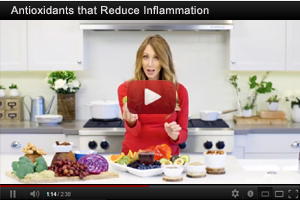
Antioxidants!
 What are Antioxidants?
What are Antioxidants?
Antioxidants are intimately involved in the prevention of cellular damage ...the common pathway for cancer, aging and various diseases.
The scientific community has begun to unravel some of the mysteries around this topic and the media has started our thirst for knowledge.
Athletes have a keen interest because of health concerns and the idea of enhanced performance and recovery after exercise.
This should serve as a beginners guide to what antioxidants are and to review their role in exercise, nutrition and our overall health.
The following is only a glimpse into the dynamics of how and why they are so important in our diet.
Antioxidants are molecules that can safely interact with free radicals and terminate the chain reaction before vital molecules are damaged.
Although there are several enzyme systems within the body that scavenge free radicals, the principle vitamin or micronutrient antioxidants are beta-carotene,
vitamin C and vitamin E. Additionally, selenium, a trace metal that is required for proper function of one of the body's antioxidant enzyme systems, is sometimes
included in this category. The body cannot manufacture these micronutrients so they must be introduces through our diet.
Beta-carotene is a precursor to vitamin A (retinol) and is present in:
- egg yolk
- milk
- butter
- carrots
- squash
- broccoli
- spinach
- yams
- tomato
- cantaloupe
- peaches
- grains
- liver
Because beta-carotene is converted to vitamin A by the body there is no set requirement. Instead the RDA is expressed as
retinol equivalents (RE), to clarify the relationship. (Vitamin A has no antioxidant properties and can be quite toxic when taken in excess.)
Vitamin E : d-alpha tocopherol. A fat soluble vitamin found in:
- nuts
- seeds
- vegetable oils
- fish oils
- whole grains
- wheat germ
- apricots
Current recommended daily allowance (RDA) is 15 IU per day for men and 12 IU per day for women.
Vitamin C : Ascorbic acid is a water soluble vitamin found in:
- citrus fruits and juices
- green peppers
- cabbage
- spinach
- broccoli
- kale
- cantaloupe
- kiwi
- strawberries
The RDA is 60 mg per day. Any amount above 2000 mg could bring on adverse side effects in some people.
The Power of Antioxidants
 What are Antioxidants and what do they do?
What are Antioxidants and what do they do?
The foods we eat contain more than just vitamins, minerals, proteins, carbohydrates and fats. Many foods also contain
antioxidants, which help to protect us against cancers, heart disease and other conditions. Antioxidants help block free
radicals, which are compounds that can damage the body's cells. Therefore, antioxidants help prevent damage to cells and can help
repair cells. This can help protect you against cancer, heart disease and improve your immune function.
Antioxidants include vitamin A, vitamin C, vitamin E, beta-carotene, lycopene, lutein and many others. You will find antioxidants
primarily in fruits, vegetables, nuts, whole grains and teas. Typically, the more colorful the fruit or vegetable, the higher
antioxidant content it has.

CAUTION: Antioxidant supplements have not proven to be effective and some of them can increase your risk for certain diseases. Your best
way to get all of these antioxidants is to eat a well-balanced diet, including many brightly colored fruits and vegetables. Try
to include a fruit or vegetable with each of your meals.
*These statements have not been evaluated by the Food and Drug Administration. These products are not intended to diagnose, treat, cure, or prevent any disease.
|










